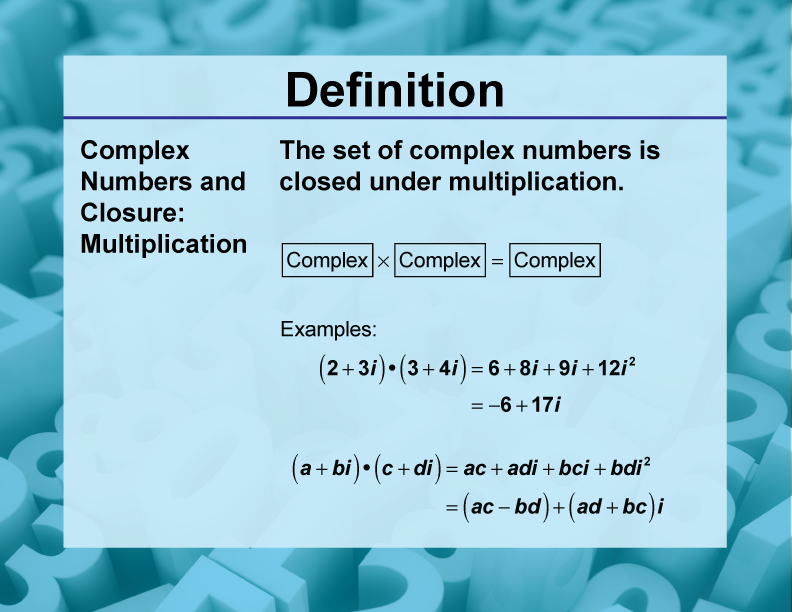
Display Title
Definition--Closure Property Topics--Complex Numbers and Closure: Multiplication
Display Title
Complex Numbers and Closure: Multiplication

Topic
Math Properties
Definition
The closure property for multiplication of complex numbers states that the product of any two complex numbers is always another complex number. This property ensures that the set of complex numbers is closed under multiplication, maintaining the integrity and consistency of the complex number system.
Description
Complex numbers, expressed in the form a + bi where a and b are real numbers and i is the imaginary unit (√-1), form a fundamental mathematical system with wide-ranging applications. The closure property for multiplication of complex numbers is crucial in establishing the complex number system as a field, which is essential in advanced mathematics and various scientific disciplines.
Algebraically, we can demonstrate this property as follows: Given two complex numbers z₁ = a + bi and z₂ = c + di, their product is: z₁ × z₂ = (ac - bd) + (ad + bc)i This result is always a complex number, proving the closure property for multiplication.
The closure of complex numbers under multiplication has significant real-world applications, particularly in electrical engineering, quantum mechanics, and signal processing. For instance, in the analysis of AC circuits, complex multiplication is used to calculate power and energy relationships. In quantum mechanics, complex number multiplication is fundamental in describing the state of quantum systems and their evolution over time.
In mathematics education, understanding the closure property for complex number multiplication helps students grasp the structure and behavior of more abstract number systems. It serves as a stepping stone to more advanced concepts in complex analysis and provides a foundation for understanding other algebraic structures like rings and fields.
Teacher's Script: "Let's multiply two complex numbers: (2 + 3i) × (1 - 4i). We use the distributive property and remember that i² = -1: (2 + 3i)(1 - 4i) = 2(1 - 4i) + 3i(1 - 4i) = (2 - 8i) + (3i - 12i²) = 2 - 8i + 3i + 12 = 14 - 5i. As we can see, the result is another complex number. Can you think of any two complex numbers whose product wouldn't be a complex number?"
For a complete collection of terms related to the Closure Property click on this link: Closure Property Collection.
| Common Core Standards | CCSS.MATH.CONTENT.HSN.RN.B.3, CCSS.MATH.CONTENT.HSN.CN.A.2 |
|---|---|
| Grade Range | 9 - 12 |
| Curriculum Nodes |
Algebra • The Language of Math • Numerical Expressions |
| Copyright Year | 2021 |
| Keywords | Closure Property |